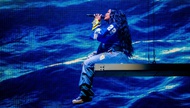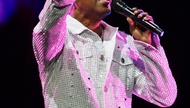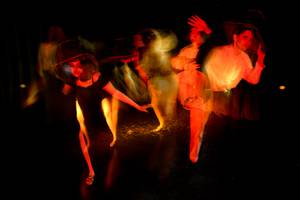Your songs can be very different live—more jammy, and sometimes a little heavier. Yeah, we’ve always made a concerted effort to extend certain sections and give songs another element live that we don’t necessarily have on the records.
Is that why you recorded the most recent record (June’s All Your Favorite Bands) almost entirely live? Yeah, it has always been a struggle for us to put on the record what we do live, and we’ve always felt that we are at our best as a band in the live setting. The mentality was, let’s go make it sound as live as we can and capture that energy in the studio. That’s how [producer] Dave [Rawlings] records all of his music. We were all facing each other, and we tried creating that vibe that you get onstage. And it seemed to work out.
You also road-tested the songs, right? How did getting to see audience reactions affect the final outcome? There were certain sections that just weren’t hitting live, so we would structure them differently, like the bridge would come after the second chorus as opposed to after the solo, something like that. That kind of experience is invaluable. Even with countless hours of rehearsal, you can’t get what you get playing the song in front of an audience in one show.
Is there a particular song you think really benefitted from that? “Right on Time” definitely came together in that particular way. It became more driving. All of them really benefitted, though.
A lyric from the title track stood out for me: “May all your favorite bands stay together.” Where did that idea come from? [Frontman] Taylor [Goldsmith] had that line for a long time—he was actually singing the chorus for a long time and didn’t know what to do with it. The song was written for a friend, a younger person who was kind of finding their way, this was like a good-tidings-to-you sentiment. Despite what you may experience, how traumatic certain things can be, try to hold onto that element that makes you youthful. If you really unpack it, it’s somebody who’s graduated from adolescence.
Dawes’ lyrics remind me of signature LA artists like Jackson Browne, The Eagles and Tom Petty. Is that the music you and Taylor were raised on growing up in Southern California? We were more raised on soul and Steely Dan, and Bob Dylan to a certain extent. We didn’t really start getting into that stuff until people started making the comparisons. It makes sense, I guess, but when we released our first record that was a common criticism or a common comparison, but I didn’t listen to a Jackson Browne record until I was like 19. I had heard some of his songs, but I didn’t dig deeper into his catalog until we were given the opportunity to meet him and hang out with him. I didn’t develop an affinity for Joni Mitchell or The Eagles until later as well, and I know the same goes for Taylor.
Maybe it has something to do with being raised in LA and the commonality that we all experience as Angelenos. For any artist, where you come from influences your tastes and forms your decisions and aesthetic values. LA is a giant city, yet there’s a certain closeness, and it definitely cultivates a certain type of lifestyle.
Your musical style brushes up against a lot of genres. I’ve seen you on bills that were bluegrass, alt-country, rock, folk. How would you describe it to someone who hasn’t heard you? I usually just go with rock ’n’ roll, but I can see why somebody might want to call it Americana or folk or indie rock. It’s tough for me to say objectively it’s this or that—it’s whatever the listener makes it. But I’m happy we do brush up against all these different genres, because it’s given me opportunity to play with a lot of artists that are very different from one another.
Dawes with John Moreland. August 8, 9 p.m., $20-$25. The Sayers Club, 702-761-7618.







